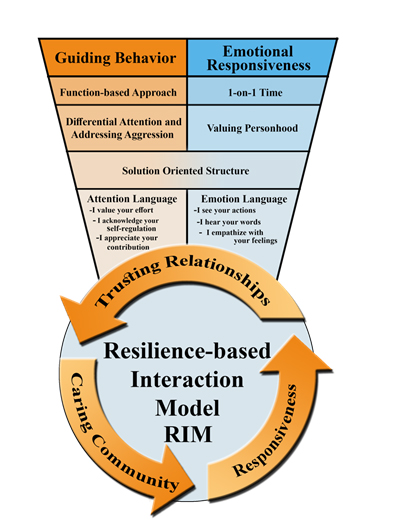
Mental health in children is the development of social-emotional competence and self-regulation in the context of home, school, and community.
Mental health issues in childhood are more common than were previously thought. Having mental health issues does not mean that the child has a diagnosable mental illness; rather, that the child needs support in order to have a healthy social-emotional development.
In early childhood, mental health issues manifest themselves in the form of challenging behaviors. Children with challenging behaviors usually exhibit two types of behaviors:
- Externalizing behaviors: outbursts, tantrums, verbal and physical aggression, defiance, etc.
- Internalizing behaviors: withdrawal, isolation, anxiety, mood change, sadness (depression) and crying, complaint of various pains, eating and/or sleeping problems, etc.
Both types of behaviors are serious and often signal a strong likelihood for serious mental health issues later in life, if not addressed early on.
Our Schools and Children with Mental Health Issues
Young children with mental health issues, particularly those who exhibit externalizing challenging behaviors (such as aggression, tantrums, and outbursts), have been the target of suspension and expulsion from schools, as early as in preschool. In fact, preschoolers with challenging behaviors are expelled from schools at three times the rate of children in Kindergarten through 12th grade, according to a seminal research on the rate of preschool expulsions in the United States.

In a recent report from the US Department of Education, it was found that African American boys and children with disabilities form the highest number of children who have been and continued to be expelled from preschools due to challenging behaviors.
A challenging behavior usually signals that the child needs social-emotional support in order to be able to function successfully in school, in the community, and at home.
Children with both kinds of challenging behaviors (externalizing and internalizing) are at risk for:
- Academic failure, often leading to school dropouts;
- Relationship problems with adults and peers;
- Problems with authorities and authority figures;
- Further physical and mental health issues in adulthood.
Causes of Mental Health Issues in Children
Mental health issues and challenging behaviors may have different and multiple causes. Often different factors work together in combination with one another. These are:
- Genetic makeup;
- Ongoing stress factors, such as parenting, crisis, adverse events;
- Trauma or traumatic events;
- Child maltreatment (abuse and neglect);
- Parenting issues;
- Developmental disorders.
Who is at a High Risk for Mental Health Issues?
- Children who live in poverty are more likely to experience mental health issues due to adverse conditions, dangerous communities, and daily stressors;
- Children with developmental disabilities are more likely to be poor and be the subject of maltreatment and thus are at risk for additional mental health issues.
The Resilience-based Interaction Model (RIM)
The Resilience-based Interaction Model (RIM) is a teacher-preparation model of working with children in order to address their challenging behaviors and support their mental health and emotional development.
Although the model has only been used for preschool and elementary grade students, it is completely applicable to an older age group of students. The model is currently a professional development model, being tested in a research project in an early childhood education program,
Erie Neighborhood House, in six classrooms.
Mojdeh Bayat, professor in the DePaul College of Education and director of the Early Childhood Education Doctoral Program, and a group of Early Childhood Education doctoral students are in the process of standardizing the model in a developmental coaching configuration. Their goal is to begin development of the application of this model to working with families within the next two years.
What are the Key Components of RIM?
Using the science of resilience, RIM is a combined application of major behavioral principles juxtaposed against child-centered humanistic principles inherent in psychoanalytical and psychosocial traditions. Its goal is to not only guide children’s behavior but to be emotionally responsive to their psychological development.
 Figure 1: Conceptual Framework of the Resilience-based Interaction Model- RIM
Figure 1: Conceptual Framework of the Resilience-based Interaction Model- RIM
It consists of simple strategies for teacher-child interactions, such as teacher’s attitudes, reactions to the child’s behaviors, and specific languages used with the child. The techniques that teachers learn to use are simple. Teachers and children are not required to do anything outside of their typical daily lessons and classroom activities.
The key components of RIM are: establishing and maintaining a positive adult-child relationship, responding to the child’s bids for attention positively, guiding the child’s behavior, and creating caring relationships between and amongst the classroom community members.
In this approach, teachers learn to be aware of their own behaviors and attitudes and use specific techniques and languages with children, which would support children’s self-regulation and self-awareness.
Initial teacher training in RIM techniques takes about 20 to 30 hours, followed by further coaching, teacher support, and problem-solving.
The foundations of RIM are laid out in a book,
Addressing Challenging Behaviors and Mental Health Issues in Early Childhood. A second book on the model is forthcoming in 2018, to be published by
Routledge and the Council for Exceptional Children (CEC).
Mojdeh Bayat is on the faculty of the College of Education at DePaul University. She is an expert in early childhood development and education of children with developmental disorders --in specific children with autism, and in methods of working with children who are at risk. Dr. Bayat is the author of Teaching Exceptional Children: Best Practices in Inclusive Early Childhood Education Classrooms (2017), NY: Routledge, and Addressing Challenging Behaviors and Mental Health issues in Early Childhood (2015), London, NY: Routledge.
Bayat is deeply committed to promoting the educational rights and the quality of life of all children who are at risk for developmental, social-emotional, and mental health issues due to growing up in adversities, or due to neurobiological conditions. She advocated for inclusion and human rights of children with disabilities in Cote d’Ivoire, West Africa and in Mexico.
Interested in Early Childhood
Education?
Early childhood educators create safe, nurturing and stimulating play environments where children learn and grow. They are leaders who find creative ways to improve educational opportunities for all young children, act as advocates for them and their families and have a lasting impact on a child's development and their outlook toward education. DePaul offers Early Childhood Education programs at the undergraduate, masters and doctoral levels.
Explore the BSExplore the MA/MEdExplore the EDD